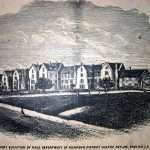Let me not be mad
RTE television tonight screened ‘Behind the Walls‘ the second of two episodes of a documentary charting the history of Ireland’s psychiatric hospitals. During the middle decades of the 20th century, Ireland led the world in locking up more of its people per capita in mental hospitals than any other country in the world, including the old Soviet Union.
The first episode showed the performance of lobotomies a procedure used internationally and commented on by English writer John Simpson in his memoir of his childhood, Days from a Different World. He notes under 12th February 1947.
“A sinister little pamphlet called ‘Pre-frontal Leucotomy in 1000 Cases’ was published that day by the Stationery Office at a price of sixpence. Based on the theory that ‘something must be done in some mental illnesses to break the connexion between the patient’s thoughts and his emotions’, it examined the results in a wide variety of patients. When successful, it said, cutting the physical links between one part of the brain and the rest had enabled a third of the people whose cases were recorded to resume their everyday activities ‘without that emotional tension and preoccupation with hallucinations and phantasies which has hitherto handicapped them’. Another third had shown signs of improvement, though not to the point where they could be discharged from hospital. And the rest? No details were available, except that 3 per cent of them had died. It showed, said one medical writer, that the operation was well worth while in carefully selected cases. Today, pre-frontal leucotomy would be regarded by many surgeons and psychiatrists as a quite unnecessary form of torture’.
Last week’s episode featured Hanna Greally, held for almost twenty years, but able to rebuild her life after release in the 1970s and able to write about her experiences. To imagine Hanna Greally’s story as something from the distant past would be to deny a reality that persisted until recent times.
‘Why am I here?’ asked a man admitted to a psychiatric hospital in 1976 because he was depressed through marital problems. A woman committed to hospital by her brother in 1974 had become estranged from her family after leaving the Roman Catholic Church to join a Protestant group. Both were subjected to regimes that owed more to the Nineteenth Century than the late Twentieth.
They were fortunate in being able to extricate themselves from the system; the grimness of the plight of those who had spent decades in care was captured in Sebastian Barry’s novel The Secret Scripture, published in 2008. Roseanne McNulty, the main character has spent most of the twentieth century in psychiatric care, for no apparent reason. Dr Grene, the senior psychiatrist in the fictional hospital writes that there is a need to undertake
. . . a task long avoided, which is to establish what circumstances brought in some of the patients, and whether indeed, as was tragically true in some cases, they were sectioned for social rather than medical reasons. Because I am not so great a fool as to think that all the ‘lunatics’ in here are mad, or ever were, or were before they came here and learned a sort of viral madness. These people are perceived by the all-knowing public at large, or let us say public opinion as it is mirrored in the newspapers, as deserving of ‘freedom’ and ‘release’. Which may be very true, but creatures so long kennelled and confined find freedom and release very problematic attainments, like those eastern European countries after communism.
It would have been encouraging if Barry’s novel was merely a retrospect, that Roseanne McNulty’s plight was something left behind in the 20th Century, to become as distant a memory as Simpson’s recalling of the pamphlet on pre-frontal leucotomy, yet
RTE’s programme this evening points to an institutionalisation that still persists, that people subject to regimes of medication for year upon year find problems with ‘freedom and ‘release’. In another generation, will there be a similar documentary telling of the current times?



Comments
Let me not be mad — No Comments
HTML tags allowed in your comment: <a href="" title=""> <abbr title=""> <acronym title=""> <b> <blockquote cite=""> <cite> <code> <del datetime=""> <em> <i> <q cite=""> <s> <strike> <strong>